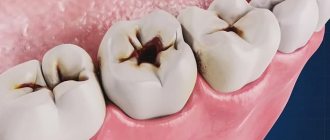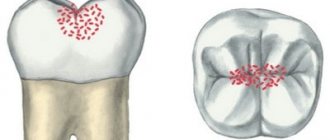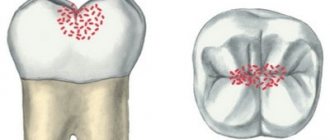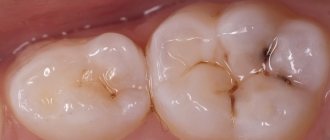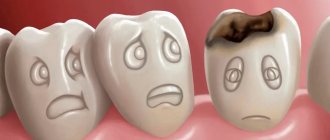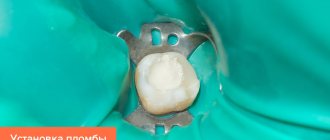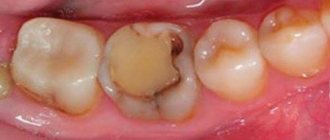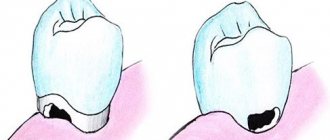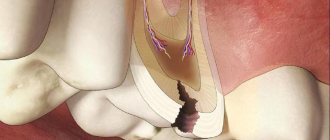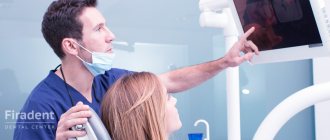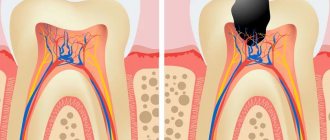The treatment tactics for caries depend on the cause of the pathological process and its neglect. This is the most common dental disease, characterized by gradual tooth decay. The pathology goes through several successive stages; at first, the patient may not feel anything; in complex cases, complete loss of dental units is possible.
It is not difficult to detect the disease, because most of the symptoms are quite obvious. However, it is better to prevent the occurrence of carious lesions by following preventive recommendations, and then a snow-white smile will delight you for many years.
Caries - what is it?
More than 95% of the inhabitants of our planet face the disease. Thus, it can be called the most common dental problem. At the very beginning, the pathological process affects only the enamel, and in the absence of therapy it penetrates into the deep hard layers. Then the soft tissues with nerve fibers and blood vessels become inflamed.
The disease is insidious because in the earliest stages it does not manifest itself in any way, and the patient begins to sound the alarm only when acute pain and a large hole appear that cannot be eliminated by conservative methods.
How many teeth with caries can be cured at one time?
The decision is made by the attending physician after a thorough examination. Factors such as the complexity and technical features of the procedure, the patient’s health status, and the presence of allergic manifestations are taken into account here. In some cases, it is prohibited to treat even two teeth at the same time.
Previously, dentists used the rule “One appointment, one tooth treated.” Today there are no such restrictions, but only a few teeth with caries can be treated at a time. Other diseases require more attention from a doctor.
Causes of caries development
Oral disease develops under the influence of pathogenic microorganisms that multiply in a favorable environment. Dentists are of the opinion that the disease occurs due to changes in the acid-base balance on tooth surfaces. Fermentation of carbohydrates caused by pathogenic bacteria releases destructive amounts of organic acids.
The main factors that contribute to the formation of carious cavities:
- improper hygiene care;
- eating problems;
- systemic chronic or acute diseases of the gastrointestinal tract;
- reduced concentration of vitamins and minerals in the body;
- hereditary predisposition, etc.
Bacterial plaque and tartar
Streptococci are microorganisms that live in organic acids, leading to the destruction of enamel and dentin. During brushing, soft structures are easily removed, but hardened structures cannot be removed. They also contain pathogens that cause destructive phenomena.
Poor nutrition
Every person knows from an early age that you can’t eat a lot of sweets. However, adults often ignore this rule and consume large amounts of carbohydrates, sugar, baked goods, and starchy foods. The enamel layer becomes thinner and more susceptible to external factors. Bacteria multiply better in a carbohydrate environment.
Decreased salivation
During the day, a person secretes about 2 liters of saliva. The secretion washes away food debris from dental surfaces and protects them from the negative effects of pathogenic microflora. If the salivary glands do not function well enough, a lot of food particles settle on the crowns, which the microbes feed on.
Violation of the mineral composition of enamel
This factor is directly related to diet. Demineralization is observed with a meager, monotonous menu, lack of calcium, phosphorus and fluorine. Seeds, cottage cheese, cheese, red beans, and buckwheat are rich in such microelements.
Genetic predisposition also influences mineralization. This means that the disease can be inherited from parents and other relatives.
The problem occurs in pregnant women at different gestational stages. The fetus takes all the useful minerals, and the expectant mother experiences a lack of them. Subsequent intervention is complicated by the inability to use anesthesia.
What is the difference between caries and pulpitis?
Caries and pulpitis are the most common dental diseases. They are very similar to each other, but there are also differences. The main difference is the depth to which inflammation has developed in the tooth tissues.
Caries appears at the initial stage of tooth damage. A small stain or darkening appears on the surface. This is called the first manifestation of caries. Subsequently, inflammation develops and moves deeper into the tooth. Caries that has reached the nerve is called pulpitis. Pulpitis already affects the nerve, and not just the tooth tissue. Pulpitis is characterized by severe pain, and caries can be accompanied by a painful reaction to sweets and cold foods.
Advantages of the Novodent clinic
Many patients come to us from Khimki, Kursk, Novogorsk and other cities. The list of advantages of contacting us includes the following:
- Affordable prices for treatment, many special offers and discounts.
- High-quality provision of services for all categories of patients.
- Safe, proven preparations for fillings and anesthesia.
- High speed of completion of all tasks assigned to the doctor.
- Extensive consultations on all issues related to the prevention and improvement of oral health.
- Lots of services and treatment options.
- Advanced equipment and techniques.
Call us or leave a request on the website to make an appointment with a dentist at a convenient time.
Tooth decay is contagious - fact or fiction?
Some scientists consider caries to be a contagious disease, since its occurrence and development is caused by pathogenic microbes. The microorganisms themselves are transmitted by contact, which means that caries is theoretically a contagious disease.
Other experts point out that each person has his own pathogenic microflora in his mouth, but it does not always cause caries. The disease appears as a result of poor hygienic care, as well as as a result of exposure to a number of other factors. It turns out that caries is not a contagious pathology, despite the existing theoretical calculations.
Is it necessary to treat caries at the initial stage if the tooth does not hurt?
It is necessary to treat caries, since the process of disease development has already begun.
As long as the destruction has not affected the pulp (tissue complex), you can quickly cope with the treatment and relieve the patient from unpleasant sensations and significantly save the family budget, since treating pulpitis is much more expensive. Treatment of a tooth that has only been affected by caries will take 10-15 years minutes and will cost 3-5 times less in a paid clinic than working on a tooth with pulpitis or other complex disease. To install a filling in a complex case, you will need to visit the clinic at least 2-3 times.
Why is it better to treat caries at the Medikastom dental clinic?
- Many years of experience. The dental clinic has been operating since 2000, successfully providing care to patients even with complex illnesses.
- Highly qualified staff who treat each patient with care and sensitivity.
- First-class equipment and modern drugs.
- Using the latest developments and treatment methods.
- Affordable cost of caries treatment.
- Maximum comfortable conditions for the patient.
- Caries treatment 24/7. Our clinic works for you around the clock, without holidays and weekends, providing qualified assistance when it is most needed.
You can get detailed information on caries treatment by calling us at +7(499) 283-71-58.
Call and sign up for a free consultation right now!
We are waiting for you!
How is caries treated using the ICON method?
When dental caries in adults is in the staining stage, it can be treated with a non-invasive infiltration method. This technology allows you to stop the spread of carious lesions deep into the tooth without the use of a drill.
Caries is treated according to the following scheme:
- The dentist removes plaque and other deposits from the surface of the tooth enamel.
- A special etching gel with hydrochloric acid is applied to the affected area.
- Within two minutes the surface layer is removed;
- After two minutes, the gel is washed off with an air-water jet, the surface is dried and washed with an ethanol solution to remove residual moisture from the porous areas of the tooth. At the final stage, the tooth is covered with a composite material that seals the pores of the tooth enamel.
The main advantages of the method: it is possible to treat both caries of permanent teeth and baby teeth for children.
The treatment is absolutely painless, so no anesthesia is needed. Healthy areas of dental tissue are preserved during treatment. You can quickly and easily treat carious lesions on several teeth in one visit. The procedure takes no more than 15 minutes.
How is caries treated without drilling?
Many adults are even more afraid of dentists than children, and prefer to treat dental caries using non-invasive methods, without the use of dental burs. Conservative treatment without drilling teeth can be carried out using several methods.
The first option is remineralization. When caries just begins to affect the tooth enamel, a small white spot forms on it. This is the focus of demineralization - the zone in which the loss of mineral components of the enamel began. If you notice a change in enamel color in time and contact your dentist, your doctor may prescribe remineralization therapy to restore mineral balance. The dentist treats the patient’s teeth with special fluoride and calcium-containing preparations, makes medicinal applications, or prescribes home use of medications with a similar effect. Deep fluoridation is considered the most effective method of remineralization therapy.
Children and pregnant women: features of their treatment
Methods of dealing with dental problems in a child depend on his age. When looking for an answer to the question of how caries of baby teeth is treated, you need to take into account the degree of neglect of the disease. Delivering a lot of unpleasant experiences to a small patient, it affects the growth and development of permanent (molar) teeth. To prevent them from being damaged during teething, you should not turn a blind eye to the existing carious cavities in your child’s mouth. How to treat bottle caries is decided directly by the dentist himself, in consultation with the baby’s parents.
Many expectant mothers are concerned about the question of whether caries can be treated during pregnancy. The likely consequences and negative effects of painkillers on the developing fetus frighten most pregnant women. Exposure to an even greater risk of developing this disease, young mothers should treat their health with increased attention. Beginning damage to tooth enamel should be stopped immediately to prevent possible complications in the form of pulpitis or the development of a cyst.
Root caries
Root caries
develops deep under the gum, violating the integrity of the tissues, while during visual inspection it may not be noticeable.
The basal species is localized on exposed roots and is characterized by a rapid course of the process. The enamel in the root zone has a minimum thickness, so it is quickly destroyed under the influence of external factors. How to treat root caries
is an important question that only a dentist can answer after an initial examination and a comprehensive diagnosis.
Is it necessary to treat caries on baby teeth?
This question plagues many parents, but it is important to listen to experts. It is imperative to treat baby teeth at the first signs of pathology. The condition of baby teeth affects the formation of the jaw and the growth of permanent teeth. If baby teeth fall out prematurely, the molars will grow crooked.
Damaged teeth in the oral cavity will lead to the appearance of chronic infectious diseases, as well as serious allergies. This can be avoided if you monitor the condition of your child's teeth.
